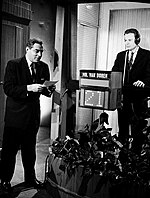Who Wants to Be a Millionaire? is an international television game show franchise of British origin, created by David Briggs, Mike Whitehill and Steven Knight. In its format, currently owned and licensed by Sony Pictures Television, contestants tackle a series of multiple-choice questions to win large cash prizes in a format that twists on many game show genre conventions – only one contestant plays at a time, similar to radio quizzes; contestants are given the question before deciding whether to answer, and have no time limit to answer questions; and the amount offered increases as they tackle questions that become increasingly difficult. The maximum cash prize offered in most versions of the format is an aspirational value in local currency, such as £1 million in the UK or ₹75 million in India.

Press Your Luck is an American television game show created by Bill Carruthers and Jan McCormack. Contestants answer trivia questions to earn "spins" on a randomly cycling game board. The board's spaces display cash, prizes, extra spins, special items, or the show's mascot, a cartoon creature known as the Whammy. Landing on a Whammy eliminates any cash and prizes accumulated while also displaying a short comedic animation. Its format is a revival of an earlier Carruthers production, Second Chance, which was hosted by Jim Peck and aired on ABC in 1977. The original version of Press Your Luck aired on CBS between 1983 and 1986. This version featured Peter Tomarken as host, Rod Roddy as announcer, and Carruthers as both director and voice of the Whammy. The original incarnation of the show gained significant media attention in 1984 for contestant Michael Larson, who won over $100,000 after memorizing the original pattern of the game board.

The $64,000 Question was an American game show broadcast in primetime on CBS-TV from 1955 to 1958, which became embroiled in the 1950s quiz show scandals. Contestants answered general knowledge questions, earning money which doubled as the questions became more difficult. The final question had a top prize of $64,000, hence the "$64,000 Question" in the show's title.

Name That Tune is an American television music game show. Originally created and produced by orchestra conductor Harry Salter and his wife Roberta Semple Salter, the series features contestants competing to correctly identify songs being played by an on-stage orchestra or band.
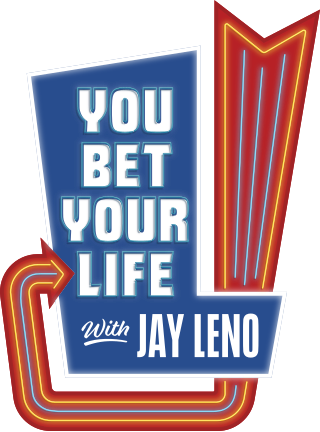
You Bet Your Life is an American comedy quiz series that has aired on both radio and television. The original version was hosted by Groucho Marx of the Marx Brothers, with announcer and sidekick George Fenneman. The show debuted on ABC Radio on October 27, 1947, moved to CBS Radio debuting October 5, 1949, and went to NBC-TV and NBC Radio on October 4, 1950. Because of its simple format, it was possible to broadcast the show on both radio and television but not simultaneously. Many of the laughs on the television show were evoked by Groucho's facial reactions and other visual gimmicks. So the two versions were slightly different. The last episode in a radio format aired on June 10, 1960. The series continued on television for another year, recording the last season, beginning on September 22, 1960, with a new title, The Groucho Show.
The Joker's Wild is an American television game show that aired at different times between 1972 and 2019. Contestants answer trivia questions based on categories determined randomly by a mechanism resembling a slot machine. The show's title refers to the game's slot-machine mechanism also having jokers, which may be used to represent any category in play at the time.

Twenty-One is an American game show originally hosted by Jack Barry that initially aired on NBC from 1956 to 1958. Produced by Jack Barry-Dan Enright Productions, two contestants competed against each other in separate isolation booths, answering general-knowledge questions to earn 21 total points. The program became notorious when it was found to be rigged as part of the 1950s quiz show scandals, which nearly caused the demise of the entire genre in the wake of United States Senate investigations. The 1994 film Quiz Show is based on these events. A new version of the show aired on NBC in 2000 with Maury Povich as host.

Jackpot is an American and Canadian television game show produced by Bob Stewart which saw contestants attempting to solve riddles in order to win cash and prizes.
Trump Card is an American syndicated game show that aired from September 10, 1990, to May 24, 1991, hosted by Jimmy Cefalo. Debi Massey served as hostess and Chuck Riley was the announcer. The show was produced by Telepictures Productions, Createl, Ltd., and Fiedler-Berlin Productions, with Warner Bros. Television distributing. It was based on the British game show Bob's Full House, which consisted of contestants trying to answer questions to fill up a 15-square bingo board.

Dream House is an American game show that saw contestants competing to win, as the title of the show indicates, a new house. The show originally premiered in primetime on ABC on March 27, 1968, with a daytime edition premiering on April 1, 1968. The primetime series aired weekly until September 19, 1968, and the daytime series aired daily until January 2, 1970, when it was replaced with All My Children. The daytime series was revived for NBC's daytime schedule and premiered on April 4, 1983, running until June 29, 1984.

Tic-Tac-Dough is an American television game show based on the paper-and-pencil game of tic-tac-toe. Contestants answer trivia questions to put up their respective symbol, X or O, on a tic-tac-toe board. Three versions were produced: the initial 1956–59 run on NBC, a 1978–86 run initially on CBS and then in syndication, and a syndicated run in 1990. The show was produced by Barry & Enright Productions.
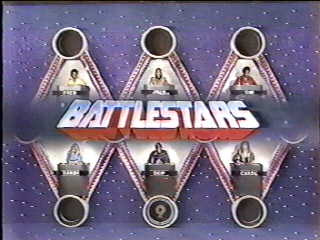
Battlestars is an American game show that aired on NBC during the 1980s. The program's concept was developed and produced by Merrill Heatter, featuring a six-celebrity panel. The object of the game is to "capture" the celebrities by lighting up numbers positioned around triangle shapes, inside of which sat each panelist. Similar to Hollywood Squares, which Heatter also co-created and produced, the celebrities are asked questions by the host, and the contestants judge the truth of their answers in order to light up the numbers.

Deal or No Deal is an Australian game show that airs on Network 10 hosted by Grant Denyer, and premiered on January 29, 2024. The program was previously broadcast on the Seven Network from 13 July 2003 to 4 October 2013. It was the first international version of the game show, after the original Miljoenenjacht from the Netherlands. It was the first of the versions to use the Deal or No Deal name. It was hosted by Andrew O'Keefe for its initial 10-year run.

Miljoenenjacht, officially Postcode Loterij Miljoenenjacht, is a Dutch game show, sponsored by the country's postcode lottery, where a contestant and at-home viewer could win up to €5,000,000 or as little as €0.01. The show is broadcast at various times, spanning across six episodes for each set. The program was originally shown by TROS on NPO 2, but moved to creator John de Mol's channel Tien in 2005. After the channel was discontinued after its sale to the RTL Group, the program moved to RTL 4. In 2019, the program moved to SBS6 due to the transfer of Linda de Mol from RTL to SBS.

Who Do You Trust? is an American television game show.

The Big Surprise is a television quiz show broadcast in the United States by NBC from October 8, 1955, to June 9, 1956, and from September 18, 1956, to April 2, 1957. It was hastily created by NBC in response to the ratings success of The $64,000 Question, which had premiered on CBS in summer 1955 and almost instantly became a hit. The Big Surprise offered a grand prize of $100,000.
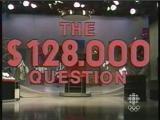
The $128,000 Question is an American game show which aired from 1976 to 1978 in weekly syndication. This revival of The $64,000 Question was produced by Cinelar Associates and distributed by Viacom Enterprises.
100 Winners was a live interactive game show on GSN, officially hosted by Jessica York, Jeff Thisted and Shandi Finnessey served as substitute hosts. Featured during the two-hour program were short interactive games from which the viewers could win prizes. The show generally aired from 12:00 midnight – 2:00 a.m. every Tuesday, Wednesday, and Sunday night. All scheduled airings of 100 Winners were replaced with episodes of quiznation.
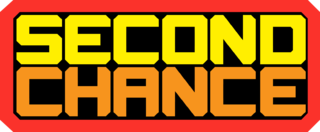
Second Chance is an American game show that ran from March 7 to July 15, 1977, on ABC. Jim Peck hosted, with Jay Stewart and Jack Clark serving as announcers. The show was a production of the Carruthers Company in association with Warner Bros. Television.
The Edge is a BBC game show that aired on BBC One from 16 March to 13 November 2015. On the show, contestants answer quiz questions and bowl balls to get prize money, but if the ball rolls over the Edge, the player is out.















